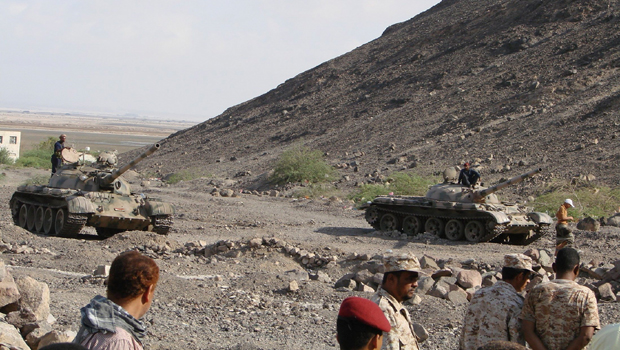
Tanks are seen at an army position in the northwestern Yemeni province of Amran June 4, 2014 in this photo provided by Yemen’s Defence Ministry. (Reuters)
Sana’a, Asharq Al-Awsat—Yemeni forces and Shi’ite Houthi rebels agreed a ceasefire deal in the northern province of Amran on Wednesday, following recent clashes between the two sides.
The deal took effect on Wednesday and stipulated an end to all military reinforcements from both sides, the deployment of impartial military monitors to the area, and the reopening of the main road to the capital Sana’a, according to Yemen’s state SABA news agency.
SABA also reported that 30 military observers had been deployed to the region to oversee the ceasefire agreement. Yemeni military forces, backed by local Sunni tribesmen, have been fighting against Shi’ite Houthi rebels—backed by allied police and military forces—for the past two months.
Yemeni President Abd Rabbuh Mansur Hadi formed a new committee, chaired by Maj. Gen. Mohammad Nasser Ahmad, to implement the articles of the agreement. The committee has 11 members and comprises representatives of the Yemeni military and the Houthi rebels, as well as unaffiliated local tribal figures.
In a statement issued by his office, UN envoy Jamal Benomar said it was important for all parties to adhere to the agreement in order to restore security and stability to the region. The statement added that Benomar had held intensive discussions with security and political figures, as well as representatives of the Houthis, to help alleviate the tension.
Yemeni National Dialogue Conference member Issam Al-Qaisi expressed concerns about adherence to the ceasefire agreement amid the failure of recent attempts to broker a truce. He told Asharq Al-Awsat: “My fear is that this ceasefire agreement could be used as a Trojan Horse, which would see our cities being handed over to a group of outcasts,” in reference to the Shi’ite group.
“There is a genuine sense of mystery about the stances of the president and the defense minister on state sovereignty,” he added.
Yemen’s military has been fighting Houthi rebels in Amran over the past two months with reports that around 400 people, mostly Houthis, have been killed in the conflict.
Local sources informed Asharq Al-Awsat that calm had been restored to Amran following the implementation of the ceasefire on Wednesday, specifically in the towns of Iyal Surayh, Jannat, Jumaimah, Mahra and Daber.
